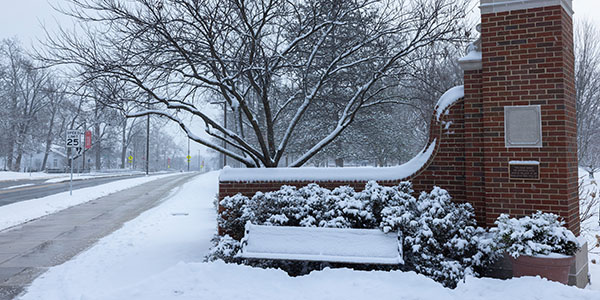Be prepared for winter weather
These tips can help Miamians stay safe and warm as temperatures drop

Stay warm
Be sure to have a winter coat and footwear readily available. Wearing heavier winter clothing and outerwear can help protect against cold weather. A warm hat, gloves, winter coat, and insulated boots can help in cold and wet conditions. Layering winter outfits also can trap heat better than a single heavy garment. Check out the latest weather forecast to stay informed about weather conditions and what to wear before leaving home.Prepare your vehicle
Road conditions can become especially hazardous during winter, making it essential to winterize your vehicle before inclement weather conditions begin. Check your car’s antifreeze levels and ensure it suits winter temperatures. According to the Ohio Committee for Severe Weather Awareness, engine oil thickens when it's cold, making it more challenging for the engine to turn over. Therefore, get an oil change and battery check before harsh winter conditions hit. Have your tires inspected, including the spare, and make sure they have the recommended amount of tread.Drive safely
Icy road conditions are the source of thousands of car crashes annually. Winter weather can create extremely hazardous road conditions. According to the National Highway Traffic Safety Administration, thousands of police-reported crashes happen during snow or sleet. The administration suggests reducing driving speed and increasing following distance during wintry weather. Also, use caution when traveling near a snow plow. Snow plows take up several lanes, frequently stop, and move slowly.Check and insulate your home
Ensure that your home is well-insulated to retain heat. Check for drafts around windows and doors and use weather stripping or caulk to seal any spaces. Insulate your pipes to prevent them from freezing. Frozen pipes can burst and cause significant damage. Consider using pipe insulation or letting faucets drip during frigid temperatures. Also, have your HVAC system checked annually.Create a winter emergency kit
Assemble winter emergency kits for your home and care. The home kit should include blankets, extra clothing, non-perishable food, water, a first aid kit, flashlights, and necessary medications. Keep important documents, such as identification, insurance policies, and medical records, in a waterproof container. Plan for alternative heating sources, such as a fireplace, and ensure they are safe and well-maintained. Your vehicle should include things similar to the home kit, including a blanket, flashlight, jumper cables, a shovel, a first-aid kit, a portable phone charger or power bank, non-perishable snacks in your car, and other necessities that can sustain you during power interruptions.Keep up to date on emergency weather and closing information at Miami.